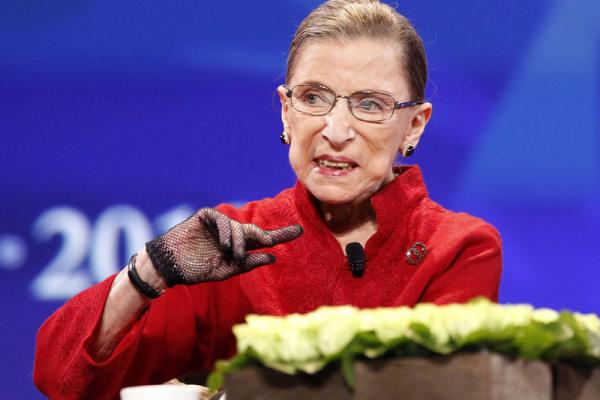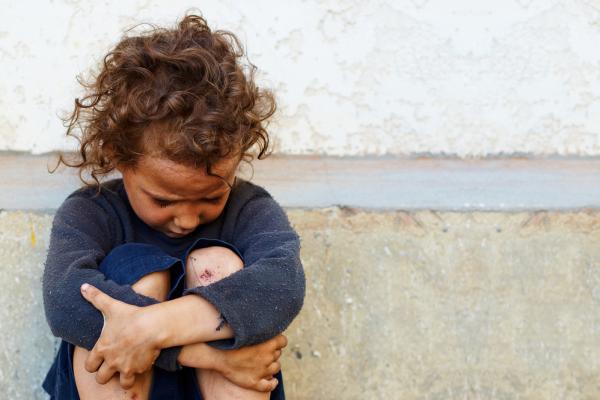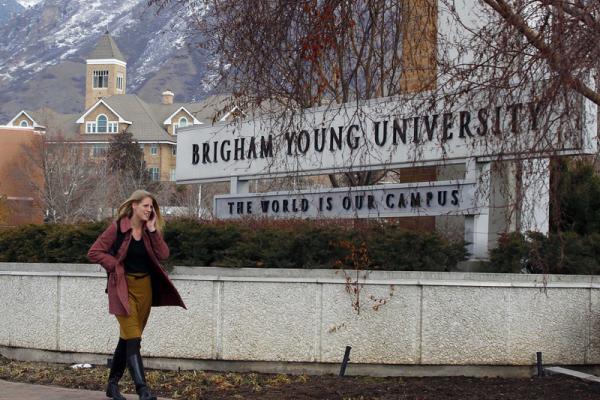When Pope Francis pays a visit to Naples March 21 he will have lunch with some 90 inmates at a local prison, a contingent that will reportedly include 10 from a section reserved for gay and transgendered prisoners, and those infected with the virus that causes AIDS.
The stopover at the Giuseppe Salvia Detention Center in Poggioreale, near Naples, was originally not scheduled to include lunch, according to a report from Tv2000, an Italian television network operated by the country’s Catholic bishops.
But the pope insisted on the meal, which will be prepared by the prisoners, some of whom will come from two other detention centers. The 90 were chosen by lottery from among 1,900 inmates, according to the Vatican Insider website .
Among the many innovations Francis has made since his election two years ago this month has been a new tone and approach to gay and transgender people.
Rabbi Ruth Bader Ginsburg?
Not quite, but when a Jewish nonprofit asked the Supreme Court justice to write a biblical commentary for Passover, she agreed, and added a feminist twist: It would raise up the often overlooked women of the Exodus story.
Ginsburg, one of three Jews and three women on the high court, is known as a champion of women’s rights — but not for being particularly religious.
But Rabbi Lauren Holtzblatt, whom Ginsburg asked to help out with the commentary, said Ginsburg had a clear vision for the piece and knew exactly which biblical women she wanted to highlight from the iconic liberation story of the Book of Exodus.
“She has a Jewish soul, there is no question,” Holtzblatt, a rabbi at Adas Israel, a Conservative synagogue in Washington, D.C., said of Ginsburg.
“It’s in her. It’s deeply in her.”
St. Mary’s Cathedral in San Francisco is getting bad press this week over a sprinkler system it installed to keep homeless people from sleeping on church grounds.
People are outraged that a church would treat the poor so callously. But St. Mary’s isn’t alone. Many houses of worship all over the country face the question of how to keep safe, welcoming grounds while being compassionate to homeless neighbors sleeping on porches and in doorways.
Here’s what we tried at Mount Vernon Place United Methodist Church in Washington, D.C.
A couple of months ago, we started a dialogue around how to move people off the porches of the church and assist them in moving on. Over the years, the protected and secluded porches had become sleeping quarters for a dozen or so folks, and it was now out of hand. People were using the grounds as bathroom facilities; others were leaving their belongings in plastic-covered 4-foot high mounds.
The conversation, held in a church committee meeting in January, was contentious.
Pardon the yawn.
The 1.8 million-member Presbyterian Church (USA) on March 17 voted to officially approve of same-sex marriage, an announcement that shouldn’t surprise anyone who has followed the mainline Protestant denomination’s trajectory. Perhaps a more substantial but less widely reported story was the decision by City Church, San Francisco’s largest evangelical congregation, to affirm LGBT couples.
Evangelicals are among the most stalwart opponents to LGBT marriage, but a number of evangelical congregations have publicly shifted their stance in the last year. Among them are Seattle’s Eastlake Community Church, Nashville’s GracePointe Church, Portland’s Christ Church, and New Heart Community Church in La Mirada, Calif. Other prominent evangelical pastors tell me off the record that they are in the midst of similar conversations.
Churches aren’t the only evangelical factions inching left on matters of sexuality.
In this Lent reflection, Grant and Uncle Graham Paulson talk about cultural genocide and forgiveness in the same breath. It is an honor to listen to someone who is possible of such a witness.
For the past 20 years or so, adoption has grown to become a staple of much of Christian culture in America. So much so that one could actually argue that adoption has become trendy within evangelical circles. As I’ve said before, if something were to become trendy, I’m glad that helping kids in need is one of them — though the trendiness of adoption has certainly led to some negative outcomes as well. While I won’t get into all of the aspects where adoption culture has gone wrong — that could take a series of posts — I do want to address what I feel is the most critical oversight we have made, and how we begin to fix it.
Orphan care is critical to the life of a Christian whether one is called to adopt (and trust me, not everyone is called to adopt — it’s not all rainbows and sunshine kisses). Caring for orphans is something we see consistently expressed in both the Old and New Testaments. In fact, James goes as far as saying that caring for widows and orphans is the only religion that God finds acceptable. While Christian culture for the past few decades has certainly taken that calling seriously, I think it is time for adoption culture to shift its focus in order to take the issue more seriously and to more effectively address the real issue at hand.
How did we miss the most important aspect of orphan care? This stems from a misunderstanding and misdiagnosis of the problem. Much of adoption culture has been led to believe that there is an orphan crisis in the world today with somewhere around 153 million children being orphaned. On the surface, this number of 153 million (provided by UNICEF) understandably leads one to believe that tonight there will be 153 million children who will go without the loving embrace of their parents. It’s a number so staggering that one can easily understand why culture mobilized and began adopting these children at rapid pace.
A group of Brigham Young University graduates is strengthening its push for students who lose their Mormon faith to retain their spots at the private school.
Students do not have to be Mormon to attend the Provo university, but those who enter as members of the Church of Jesus Christ of Latter-day Saints and later leave the faith face expulsion from BYU.
Activist group FreeBYU filed a complaint last week with the nonprofit accrediting board that evaluates the LDS church-owned school for the U.S. Department of Education. The filing alleges that the policy hinders academic and intellectual freedom at BYU, which is due for a seven-year accreditation review in April.
Organizer Brad Levin says many students who are “in the closet” about changing or leaving their faith must censor themselves in classrooms, online, and in the wider BYU community. Such students should receive the same religious protection as non-Mormons, FreeBYU contends.
“They don’t know what’s going to put them in hot water,” Levin said.
To Roman Catholic officialdom, it’s unclear whether the Virgin Mary appeared to Ivan Dragicevic and five others 34 years ago in a Bosnian village.
What is clear is that Dragicevic won’t be appearing Wednesday to speak in St. Charles, as some had hoped.
Earlier this month, Archbishop Robert Carlson addressed a memo to priests and deacons in the archdiocese:
“I have received a request from the Congregation for the Doctrine of the Faith to remind everyone that they are not to participate in events that promote the so-called visionaries of Medjugorje and in particular Mr. Ivan Dragicevic.”
Prior to the March 3 memo, Dragicevic had been scheduled to speak in St. Charles’ Lindenwood University, about 25 miles from St. Louis.
Dragicevic is one of six who claim the Virgin Mary appeared and spoke to him in 1981 in Medjugorje, a town situated in the Herzegovina region of Bosnia.
A college that requires the study of both Wordsworth and the Quran for graduation is now the first fully accredited Islamic university in America.
Zaytuna College, a five-year-old institution in Berkeley, Calif., was recognized in March by the Western Association of Schools and Colleges, an academic organization that oversees public and private colleges and universities in the U.S.
The accreditation means Zaytuna, which owns only two buildings and has 50 students, is a legitimate institution of higher learning, only a few blocks from its esteemed neighbor, the University of California, Berkeley.
“Being accredited puts us at the same table” as other accredited colleges and universities, said Colleen Keyes, Zaytuna’s vice president of academic affairs.
“It makes us equal partners.”
For faculty — of which Zaytuna has 15 — it lends credibility and status.
We don’t know what prompted Rev. Franklin Graham to log onto Facebook and pound out the words that lit a firestorm last week. But within one day, tens of thousands of his faithful followers liked and shared his short, patronizing post that called “Blacks, Whites, Latinos, and everybody else” to “Listen up” and tune in to his take on why so many black people have died at the hands of police officers recently. According to Graham, the problem is “simple.” It can be reduced to their lack of obedience and bad parenting.
By Monday morning, more than 80,000 people shared the post and almost 200,000 liked it. Sojourners’ Jim Wallis penned a strong response.
On Friday an evangelical pastor based in Oakland, Calif. (the birthplace of the Black Lives Matter movement), Dominique Gilliard, shared the post with a small diverse group of evangelical leaders who decided to craft a collective response. This open letter was crafted by the collective efforts of Rev. Leroy Barber (CCDA and Word Made Flesh), Gilliard (New Hope Oakland), Dr. Brian Bantum (Seattle Pacific University), Micky ScottBey Jones (Transform Network), Efrem Smith (World Impact) and me (Sojourners). We didn’t know if our words would resonate. We only knew the truth that we must speak in response to Graham’s outsized influence coupled with apparent ignorance. In the end, a broad representation of national evangelical leaders agreed to sign this letter to Graham as principal signatories.
We invite you to read it, discuss it in your churches, and add your name to the many who say “No more!” We will not tolerate this type of flippant, patronizing commentary from faith leaders on critical issues that mean life and death for many in the body of Christ and in communities across America. We won’t tolerate it, even one more day. Rather, we invite all with open hearts to enter into dialogue — and to join us in the ministry of the gospel — the ministry of reconciliation.








